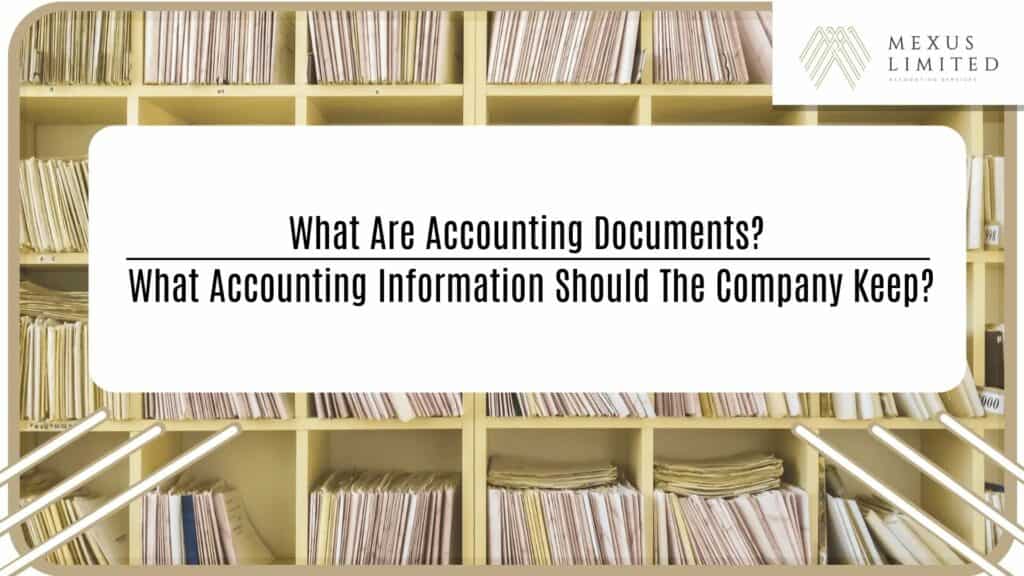What are accounting documents? What accounting information should the company keep?

Every Hong Kong company should properly manage accounting information, which is regulated by the Companies Ordinance and the Inland Revenue Ordinance. For company managers, regularly updating company accounts can help the company grow in the long run. When auditing financial statements, the company needs to provide accounting vouchers to carry out the audit work. This article will explain what accounting vouchers are.
What are Accounting Documents?
In short, accounting vouchers are any written proofs that can record the economic and financial activities of an organization/company, and generally require the stamps and signatures of relevant departments and management. However, with the advancement of technology, accounting certificates may also be extended to online media, but paper certificates still occupy a place.
The importance of accounting vouchers is that it is an important basis in the process of accounting supervision, so properly and correctly managing and preserving these materials will be the first step in accounting work. In addition, almost all countries/regions will have relevant regulations requiring records accounting vouchers are used for future audits to ensure the authenticity and compliance of the organization.
Two major categories of accounting documents
Since the business of an organization/company may be very diverse, it can be roughly divided into:
1) Original Certificate and.
2) Accounting vouchers (Vouchers).
1. Original Certificate
Typically, this type of voucher is used when checking for fraudulent accounts. Most of the original documents record the economic responsibilities that have been executed and completed, including business-related invoices, receipts, etc., which are also legally valid.
If it is issued or filled out by its own unit, it belongs to the “self-made original certificate”, while the certificate obtained from an external unit belongs to a “foreign original certificate”.
Therefore, based on the wide variety of these vouchers, it is even more necessary to take time out of daily business to record these data clearly and clearly, enter the accounts into different accounting items, sort and classify them, and make entries in a unified format to reduce accounting errors. Improve operational quality.
2. Vouchers
By reviewing the original vouchers, the accountants will summarize the correct vouchers to obtain the accounting vouchers, which are used to determine the financial status, including the accounting items that should be debited and credited. Therefore, the accounting vouchers can be regarded as accounting consolidated financial connections. Credentials, which are closely related to the original documents.
For example, the receipt and payment vouchers related to banks belong to this category, which may be a currency, fund receipt/deposit vouchers, vouchers for recording cash, account books such as sub-ledger, general ledger, etc.
In fact, accounting vouchers, such as account books, should also be attached with relevant original vouchers as attachments, to correspond to their contents and become the basis for registration details.
Requirements for accounting documents under the Inland Revenue Ordinance
According to Section 51C of the Inland Revenue Ordinance, persons carrying on a
trade, profession or business in Hong Kong are required to keep sufficient records of their income and expenses in Chinese or English so that their assessable profits can be easily ascertained.
The “business records” involved include many accounting documents:
• Books (to record income, payments, income, and expenses);
• vouchers, invoices, receipts;
• bank statement;
• Twenty relevant asset and liability records;
• Daily income and expenditure records;
• If it is involved in the sale of goods, all relevant goods arrivals, shipment records, and invoices;
• sufficient details about the goods and the buyer and seller (including quantity, value, the identity of the parties, etc.);
• Inventory statements, etc.;
Although companies are not required to report these accounting documents on their own initiative, the Commissioner of Inland Revenue still has the power to request such documents from taxpayers if required. Furthermore, the Inland Revenue Ordinance requires relevant business operators to keep such records for at least 7 years. If they violate the regulations without reasonable excuse, the relevant persons may be fined up to HK$100,000.
The above information is for reference only. If you have any questions about accounting documents, we welcome your inquiries.

